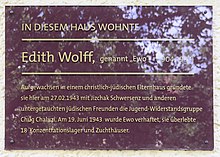Edith Wolff
Edith Wolff (also Ewo called * 13. April 1904 in Berlin , † 28. January 1997 in Haifa ), a German was a resistance fighter in the era of National Socialism and inspirer and co-founder of the underground group Chug Chaluzi .
Life
Edith Wolff grew up as the oldest of three sisters in a Christian-Jewish family. After graduating from high school in 1925, she studied philosophy . She was a member of the Jewish Blue-White Association , converted from Protestant to Jewish faith in 1933 in protest against the National Socialists and became a staunch pacifist and Zionist . Although they by the Nuremberg race laws no more than " the first Jewish mongrel degree ", but as validity Jew was classified and was therefore particularly vulnerable to widespread political writings anonymous, had numerous contacts with persecuted Jews and did escape aid . Since her aunt had her membership card disappeared from the Jewish community, she was able to act relatively unmolested.
Through Recha Freier , Wolff came to the Jewish youth welfare child and youth Alijah and got to know Jizchak Schwersenz , who taught there as a teacher. When the first deportations began in Berlin in 1941 , she organized food and ID cards to enable Jews to escape or go into hiding.
On February 27, 1943, Wolff and her friend Schwersenz founded the Zionist underground youth group Chug Chaluzi ( Pioneer Circle ). This only known Zionist underground group in Germany provided refugee aid for persecuted Jews for over a year. Of the 40 children from the Aliyah School who were hidden by the Chug Chaluzi, 33 were saved in this way.
When Wolff was arrested by the Gestapo on July 19, 1943 , she was able to hide her connections, but was sentenced to two years in prison for “favoring Jews”, the passing on of ration cards to Jews. She survived imprisonment in 18 prisons and concentration camps such as Dachau and Ravensbrück . In 1950 Wolff went to Switzerland , in 1954 she emigrated to Israel with Schwersenz . There she worked, among other things, at the Yad Vashem memorial and later became involved in promoting Jewish-Arab understanding.
Edith Wolff was awarded the Federal Cross of Merit . On April 14, 2004, a plaque in her honor was unveiled in Bundesallee 79 in Berlin-Friedenau .
Fonts
- with Jizchak Schwersenz and Shaul Esh: Jewish youth in the underground. A Zionist group in Germany during the Second World War. Bitaon, Tel Aviv 1969.
literature
- Wolfgang Benz (Hrsg.): Lexicon of the German resistance. Fischer, Frankfurt am Main 2001, ISBN 3-596-15083-3 .
- Irmgard Klönne: “In 1933 it changed. I emphasized everything Jewish ”. Edith Wolff, called Ewo - an appreciation. In: Gisela Dölle et al. (Ed.): Jüdin - German - German Jüdin? Effects of Anti-Semitism in Germany. Archive of the German Women's Movement, Kassel 1993, pp. 28–33 ( Ariadne - Almanach of the Archives of the German Women's Movement 23).
- Wilfried Löhken, Werner Vathke (ed.): Jews in resistance. Three groups between the struggle for survival and political action. Berlin 1939–1945. Hentrich, Berlin 1993, ISBN 3-89468-068-7 ( series German history - sites of the history of Berlin 87).
- Fabrice Braun: "Beware of poison". Edith Wolff founded the Jewish resistance group "Chug Chaluzi" with others in Berlin, in: Der Spiegel Geschichte 2/2019, pp. 16–23.
Web links
Individual evidence
- ↑ Birgit Schreiber: Hidden. Jewish children in National Socialist Germany and their lives afterwards. Interpretations of biographical interviews . Campus, Frankfurt am Main 2005, ISBN 3-593-37746-2 , p. 35.
- ↑ Short biography of the German Resistance Memorial Center
- ↑ a b c It was Ewo who convinced me to go into hiding
- ↑ Wolfgang Benz, Walter H. Pehle (Ed.): Lexicon of German Resistance. Fischer, Frankfurt am Main 1994, pp. 189f.
- ↑ Johannes Tuchel , Julia Albert: Resistance as a reaction to war and Nazi violent crimes. In: Federal Agency for Civic Education (Ed.): Resistance against National Socialism , Information on Civic Education No. 330, August 17, 2016.
-
^ Gudrun Maierhof: Self-assertion in chaos. Women in Jewish self-help. 1933-1943 . Campus-Verlag, Frankfurt am Main 2002, ISBN 3-593-37042-5 , p. 348.
Henning: Mielke: Jizchak Schwersenz
| personal data | |
|---|---|
| SURNAME | Wolff, Edith |
| ALTERNATIVE NAMES | Ewo |
| BRIEF DESCRIPTION | German resistance fighter against National Socialism |
| DATE OF BIRTH | April 13, 1904 |
| PLACE OF BIRTH | Berlin |
| DATE OF DEATH | January 28, 1997 |
| Place of death | Haifa |
